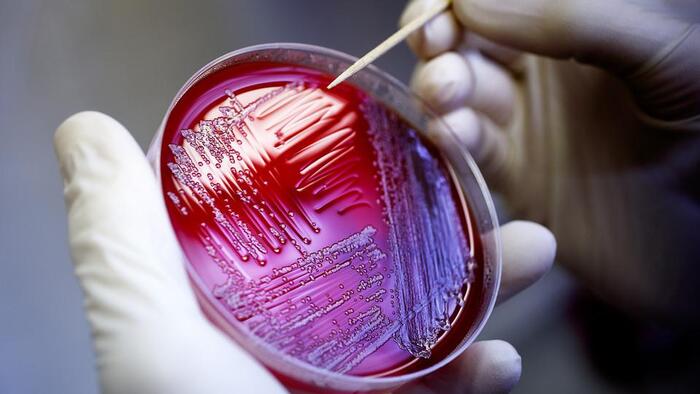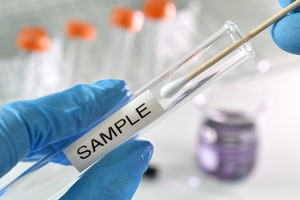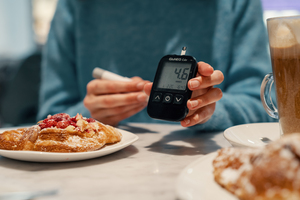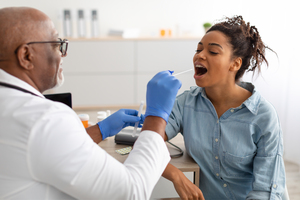Key points
- E. coli is a bacteria that can cause intestinal infection and spreads easily through contaminated food, water, or person-to-person contact.
- Symptoms of E. coli infection include severe stomach cramps, diarrhea, vomiting, and fever, usually appearing 3-10 days after exposure.
- 5-10% of people with E. coli develop Hemolytic Uremic Syndrome (HUS), a potentially life-threatening complication.
- Urgent care centers can provide treatment for E. coli infection symptoms, but severe cases may require hospitalization.
- Prevention methods for E. coli infection include meticulous personal hygiene, particularly thorough hand washing before and after handling food, after coughing or sneezing, and after using the bathroom. Urgent care centers can provide treatment for E. coli infections, but life-threatening symptoms should be handled in an emergency room.

If you live in the United States and eat romaine lettuce, you have probably heard about the 2018 E. coli outbreak. To date, 197 people across 35 states have become infected with E. coli. Of those infections, there have been 89 hospitalizations and five deaths, according to data from the Centers for Disease Control. Most of the people who became ill ate romaine lettuce grown in the Yuma region—or had close contact with someone else who got sick from eating romaine lettuce, showing that E. coli can spread quite easily.
It’s important to avoid romaine lettuce or any other food or drink that is recalled due to a reported illness of any kind. It’s also important to have a good understanding of what E. coli is, how it spreads, and how to tell if you have become infected with E. coli. Below, we’ll dive into all of these questions and more so you and your family can stay healthy and free of illness.
What is E. coli?
E. coli (Escherichia coli) is a type of bacteria that lives in the intestines of humans and animals—usually. When the E. coli bacteria is found naturally, it causes no harm and is part of a helpful ecosystem of bacteria in your gut.
However, there are some strains of E. coli that can cause intestinal infection because they produce a toxin called Shiga. The main strain of Shiga toxin-producing E. coli, or STEC, is called O157:H7. When this is present, humans and animals can develop a number of symptoms, ranging from mild to severe (more on E. coli symptoms below).
The CDC points out that while people of any age can become infected with E. coli, infants, young children, and the elderly, along with anyone who has a compromised immune system, is likely to develop severe illness from contracting the bacteria. Still, healthy older children and young adults can become seriously ill, so if an outbreak is suspected it’s important to take proper precautions.
How does E. coli spread, and what causes E. coli infection?
E. coli can enter into your body in many different ways. It’s not always clear where an E. coli infection comes from, so it’s important to be especially careful in any of the following situations, especially when there is a known outbreak of E. coli.
- Food processing — E. coli can be found in the intestines of animals like cows, pigs, and chickens. If you eat meat, you may be more likely to contract E. coli because the slaughtering process can cause the meat to acquire the bacteria.
- Improper food handling — When food is not handled properly, the likelihood of a bacterial infection such as E. coli. Some of the most common causes of food poisoning include:
- Not washing hands completely before preparing or eating food
- Using utensils, cutting boards, or serving dishes that aren’t clean
- Consuming dairy products or food containing mayonnaise that has been left out too long
- Consuming foods that haven’t been stored at the right temperature
- Consuming foods that aren’t cooked to the right temperature or duration of time, especially meats and poultry
- Consuming raw seafood products
- Drinking unpasteurized milk
- Consuming raw produce that hasn’t been properly washed
- Contaminated water — Whether you drink a glass of contaminated water or swim in a lake full of it, you could be exposing yourself to a number of bacteria, including E. coli. If you’re unsure whether water is contaminated or not, err on the side of caution.
- Person to person — Most cases of intestinal E. coli infection are contracted through contaminated food or water. However, like we’ve seen with the multi-state outbreak of E. coli in 2018, humans can also spread the harmful E. coli bacteria to one another. Just like with the flu virus, the E. coli bacteria spreads most often around daycare centers, schools, and nursing homes.
- From being around or working with animals — Cows, goats, and sheep are especially prone to passing the E. coli bacteria to humans. If you work with or around any kind of animal, it’s important that you wash your hands thoroughly and often.
What are the symptoms of E. coli?
People who get an E. coli infection generally starting feeling sick 3 to 4 days after being exposed to the bacteria. Some people, however, don’t start experiencing symptoms until up to 10 days after exposure. The symptoms of Shiga toxin-producing E. coli infection are different for each person and range from mild to severe. Some of the most common symptoms of E. coli infection include:
- Severe stomach cramps
- Diarrhea (often bloody)
- Vomiting
- Fever (usually less than 101˚F)
Most people who get infected with E. coli can recover at home within 5 to 7 days. However, while some infections are mild, others can be life-threatening. If your symptoms are severe, last longer than a couple days, or if you can’t keep liquid down, it’s important that you contact your healthcare provider, find an urgent care near you.
What is Hemolytic Uremic Syndrome (HUS)?
According to the CDC, between 5 and 10% of people who are diagnosed with STEC infection develop “a potentially life-threatening complication known as hemolytic uremic syndrome (HUS). HUS develops about 7 days after symptoms first appear, when diarrhea is improving. Clues that someone is developing HUS include decreased frequency of urination, feeling very tired, and losing pink color in cheeks and inside the lower eyelids. People with HUS should be hospitalized because their kidneys may stop working and they may develop other serious problems. Most people with HUS recover within a few weeks but some suffer permanent damage or die.”
While that certainly sounds scary, paying attention to symptoms and seeking medical attention can help prevent the development of HUS.
How is E. coli treated?
While there is no treatment that can cure the E. coli infection, the recommended treatments include getting enough rest and drinking enough fluids. Drinking fluids is especially important when you have diarrhea, as this can make you become dehydrated quickly.
If you have a more serious E. coli infection, such as the one that causes HUS, you will likely need to be treated at a hospital and will be given an IV of fluids, and potentially blood transfusions and kidney dialysis.
Note: Do not take anti-diarrheal medication, as this slows your digestive system down and will lengthen the amount of time the toxins spend in your body. While having diarrhea is not pleasant, it’s your body’s way of cleaning itself of harmful bacteria.
How can you prevent E. coli?
As with any illness, prevention is the best method of protection. While you may not know if E. coli is present in a food or beverage, you can follow certain precautions to help mitigate your risk of contracting the infection.
The best and most effective way to prevent E. coli infection, or to prevent it from spreading if it does occur, is to practice meticulous personal hygiene. Wash your hands thoroughly before and after you handle food, any time you cough or sneeze, and after you use the bathroom—every single time. Encourage any guests you have in your home to follow this safety protocol and teach your family how to follow the same. It’s especially important to teach children how to wash their hands properly.
Can you go to urgent care if you have an E. coli infection?
As you probably know, you can go to urgent care for many things—physical injuries, STD tests, vaccinations, and even allergies. So you may be wondering, can I go to urgent care if I have an E. coli infection?
The short answer is yes, an urgent care center will be able to give you an IV of fluids if you’re dehydrated due to the symptoms of an E. coli infection. They will also be able to let you know if your symptoms require more intensive treatment at a hospital, or if you should go home and rest.
If you’re experiencing potentially life-threatening symptoms, however, you should call 911 or head to your nearest emergency room. For everything else, there’s urgent care.
Book a same-day appointment at urgent care
E. coli happens, unfortunately. When it does, you need care fast. At Solv, we believe that you should be able to get last-minute, quality care without the wait. When you use Solv to make a same-day urgent care appointment, you’ll be seen even faster. Save money, save time, feel better.
FAQs
What is E. coli and how does it spread?
E. coli is a bacteria that usually lives harmlessly in the intestines, but certain strains can cause infection. It spreads through contaminated food, water, or person-to-person contact.
What are the symptoms of an E. coli infection?
Symptoms include severe stomach cramps, diarrhea, vomiting, and fever, usually appearing 3-10 days after exposure to the bacteria.
What is Hemolytic Uremic Syndrome (HUS)?
HUS is a potentially life-threatening complication that can develop from an E. coli infection. It can lead to kidney failure and other serious issues.
Can I go to urgent care for an E. coli infection?
Yes, urgent care centers can provide treatment for E. coli symptoms, but severe cases may require hospitalization.
How can I prevent an E. coli infection?
The best prevention is thorough personal hygiene, especially hand washing. Also, avoid consuming or handling food and water that may be contaminated.
How can E. coli be prevented?
The best way to prevent E. coli infection is to practice meticulous personal hygiene, especially hand washing. It's also important to handle food properly and be cautious in situations where E. coli is known to spread, such as when consuming raw produce or being around animals.
Can I go to urgent care if I have an E. coli infection?
Yes, an urgent care center can provide treatment for E. coli infections, such as giving an IV of fluids if you're dehydrated. However, if you're experiencing potentially life-threatening symptoms, you should call 911 or go to the nearest emergency room.
What happened during the 2018 E. coli outbreak in the United States?
In 2018, there was an E. coli outbreak in the United States that infected 197 people across 35 states. Most of the people who became ill ate romaine lettuce grown in the Yuma region, or had close contact with someone else who got sick from eating romaine lettuce. The outbreak resulted in 89 hospitalizations and five deaths.









